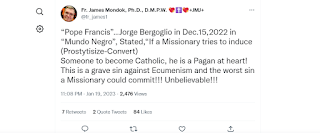By Mastro Titta (Attention satire!)
Horrible news. Catholicity and Freemasonry are still incompatible. A Filipino bishop asked the pope if this was still the case. And Francis affirmed with a sigh: "Yes, unfortunately it is still so".
Until further notice. So you have to be patient. This gr
eat chaos of God created the world in six days. It will take Bergoglio a few more years to restore it. Because of the bad news about Freemasonry, Cardinal Ravasi, the one who wrote the letter to his "dear Masonic brothers," had a hypoglycemic fit.
It is interesting to note the clarification in the note of the Dicastery for the Faith: "These measures also apply to all churchmen who may be enrolled in Freemasonry".
Too. Perhaps. In my opinion, there are more seats available on the crowded train of the busy Mortara-Milano line (Porta Genova) at peak times than are occupied by non-Freemasons in the Vatican.
It seems that the Church, which is "open to all", is not open to the dear Masonic brothers. An intolerable contradiction. However, the lodges are not exactly open to everyone and everyone. Open society, open church, closed lodges. The thing is not symmetrical. A poor Catholic in a lodge? No! A bishop, a cardinal, a pope in a lodge? Perhaps.
As always, you have to look more closely to understand. You don't carelessly throw away decades of awkward ecumenism. Grand Master Gustavo Raffi of the Masonic Grand Orient of Italy had already said it on March 14, 2013:
"With Pope Francis, nothing will be the same again".
Where on earth have I heard this melodious formula before? At least that's how the Masonic Grand Master greeted his brother Francis, seven years and a week before the pandemic battle cry, when the ecclesiastical field hospital peddled Misericordina in anticipation of vaccination, as an "act of love" and "the light of hope for all".
After all, this pontificate is the imaginary pandemic of the Catholic Church. You don't need Sherlock Holmes to understand that. Duckburg's Chief of Police, Commissioner Albert Hunter, is enough, and without Mickey Mouse.
The point is that the average Catholic, who does not shine with investigative acumen, reviews the concert of compliments that rained down on Francis from all – and I mean all – Grand Lodges in the world on the evening of his election. Such enthusiasm was not aroused even by a certain Barack Obama, who received the Nobel Peace Prize in advance so that he could then wage war undisturbed every day of his term in office.
The simple-minded Catholic, as I said, skims over everything quickly and reads that Bergoglio has affirmed the incompatibility between the Church and Freemasonry, and thinks that this is wine, and exults: "Ah, look, Bergoglio respects tradition, he does not change the doctrine, here he speaks CLEARLY, Freemason no, no, no."
But we're not here to polish little plastic Madonnas. Therefore: Dear Catholic brother, you have understood a curd cheese, a cheese, a Limburger, a Tilsiter, an Emmentaler: the entire teaching corpus of cheese making escapes you completely.
Bergoglio does not protect the Church from Freemasonry: he protects Freemasonry from the Church. He has unhinged the doors of the Church, just in case some wicked man should think of closing them again tomorrow, and has double-bolted the doors of the lodge.
In other words, the dear Masonic brethren do not want stupid brethren in their lodges. That's it. And Francis, the speaking pope, vouches for that. Heaven forbid that the dear Masonic brethren should one day find a pope at the head of the supposedly extinct Alta Vendita, God forbid, a Catholic. It's best not to risk anything. Better safe than sorry.
I'm almost a little sorry. The Vatican is teeming with secret Masonic homosexuals who can neither marry nor be initiated into the mysteries in broad daylight. Since Freemasonry remains closed to women in a time as sexually kaleidoscopic as ours, the dear Masonic brethren from across the Tiber are an elegant compromise.
Dear Catholic Brothers, pray that the dear Masonic Brothers will also open the gates of hell to you, instead of being content to exhibit it in the former papal residence on the Quirinal. 1 You do not believe that you can condemn your souls in vain.
Otherwise, get out of the grave of the pathetic fideistic do-gooders that you have scratched into your own glass with your fingernails ("He is the Pope", "The Holy Spirit has chosen him, yes") and come outside and finally breathe in a little cold, cutting, but healthy air.
Translation: Giuseppe Nardi
Image: Corrispondenza Romana
Trans: Tancred vekron99@hotmail.com
1 Auguste Rodin's "The Gates of Hell" see here.













